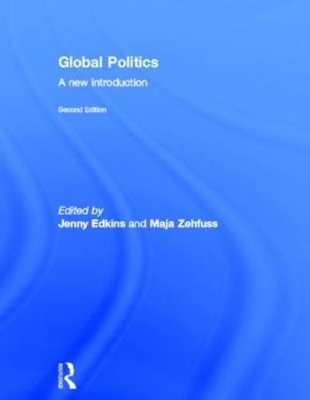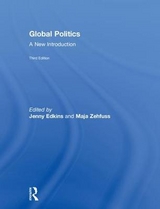
Global Politics
Routledge (Verlag)
978-0-415-68482-8 (ISBN)
- Titel erscheint in neuer Auflage
- Artikel merken
Completely revised and updated throughout, the 2nd edition also offers additional chapters on key issues such as environmental politics, nationalism, the internet, democratization, colonialism, the financial crisis, political violence and human rights.
Global Politics:
Examines the most significant issues in global politics – from war, peacebuilding, terrorism, security, violence, nationalism and authority to poverty, development, postcolonialism, human rights, gender, inequality, ethnicity and what we can do to change the world
Offers chapters written to a common structure which is ideal for teaching and learning and features a key question, an illustrative example, general responses and broader issues
Integrates theory and practice throughout the text, by presenting theoretical ideas and concepts in conjunction with a global range of historical and contemporary case studies
Drawing on theoretical perspectives from a broad range of disciplines including international relations, political theory, postcolonial studies, sociology, geography, peace studies and development this innovative textbook is essential reading for all students of global politics and international relations.
Jenny Edkins is Professor of International Politics at Aberystwyth University and has also taught at the University of Manchester and the Open University. Her publications include Missing: Persons and Politics (Cornell University Press 2011), Trauma and the Memory of Politics (Cambridge University Press 2003) and Whose Hunger? Concepts of Famine, Practices of Aid (University of Minnesota Press 2000, 2008). She is co-editor (with Nick Vaughan-Williams) of the Routledge book series Interventions, and co-organiser of the Gregynog Ideas Lab Summer School in PostInternational Politics. She is currently completing a book with the working title Making Faces, Making a Politics (Routledge 2013). Maja Zehfuss is Professor of International Politics and Associate Dean for Postgraduate Research in the Faculty of Humanities at the University of Manchester. She is the author of Constructivism in International Relations: The Politics of Reality (Cambridge University Press 2002) and Wounds of Memory: Politics of War in Germany (Cambridge University Press 2007). Her current research examines the politics of ethics in the context of war. She is a member of the National Academy of Teaching.
1. Introduction Jenny Edkins and Maja Zehfuss 2. How do we begin to think about the world? Véronique Pin-Fat 3. What happens if we don’t take nature for granted Simon Dalby 4. Can we Save the Planet? Carl Death 5. Who do we think we are? Annick T.R. Wibben 6.How do religious beliefs affect politics? Peter Mandaville 7. Why do we obey? Jenny Edkins 8. How do we find out what’s going on in the world? Debbie Lisle 9. How Does the Way we Use the Internet Make a Difference M I Franklin 10. Why is people’s movement restricted? Roxanne Lynn Doty 11. Why is the world divided territorially? Stuart Elden 12. How do People Come to Identify with Nations Elena Barbantseva 13. Does the nation-state work? Michael J Shapiro 14. Is Democracy a Good Idea? Lucy Taylor 15. Do colonialism and slavery belong to the past? Kate Manzo 16. How Does Colonialism Work? Sankaran Krishna 17. How is the world Organised Economically? V Spike Peterson 18. Is the Financial Crisis Part of Everyday Life? Matt Davies 19. Why are some people better off than others? Paul Cammack 20. How can we end poverty? Mustapha Kamal Pasha 21.Why do some people think they know what is good for others? Naeem Inayatullah 22. Why does politics turn to violence? Joanna Bourke 23. What Counts as Violence? Louise Amoore & Marieke de Goede 24. What makes the world dangerous? Michael Dillon 25.What can we do to stop people harming others? Anne Orford 26 Can we move beyond conflict? Roland Bleiker 27.Who Has Rights Giorgio Shani 28. Conclusion: What Can We do to Change the World Maja Zehfuss
| Erscheint lt. Verlag | 10.9.2013 |
|---|---|
| Zusatzinfo | 29 Line drawings, color; 5 Line drawings, black and white; 135 Halftones, color; 80 Halftones, black and white; 7 Tables, black and white; 164 Illustrations, color; 85 Illustrations, black and white |
| Verlagsort | London |
| Sprache | englisch |
| Maße | 189 x 246 mm |
| Gewicht | 1656 g |
| Themenwelt | Sozialwissenschaften ► Politik / Verwaltung ► Europäische / Internationale Politik |
| ISBN-10 | 0-415-68482-X / 041568482X |
| ISBN-13 | 978-0-415-68482-8 / 9780415684828 |
| Zustand | Neuware |
| Haben Sie eine Frage zum Produkt? |
aus dem Bereich



